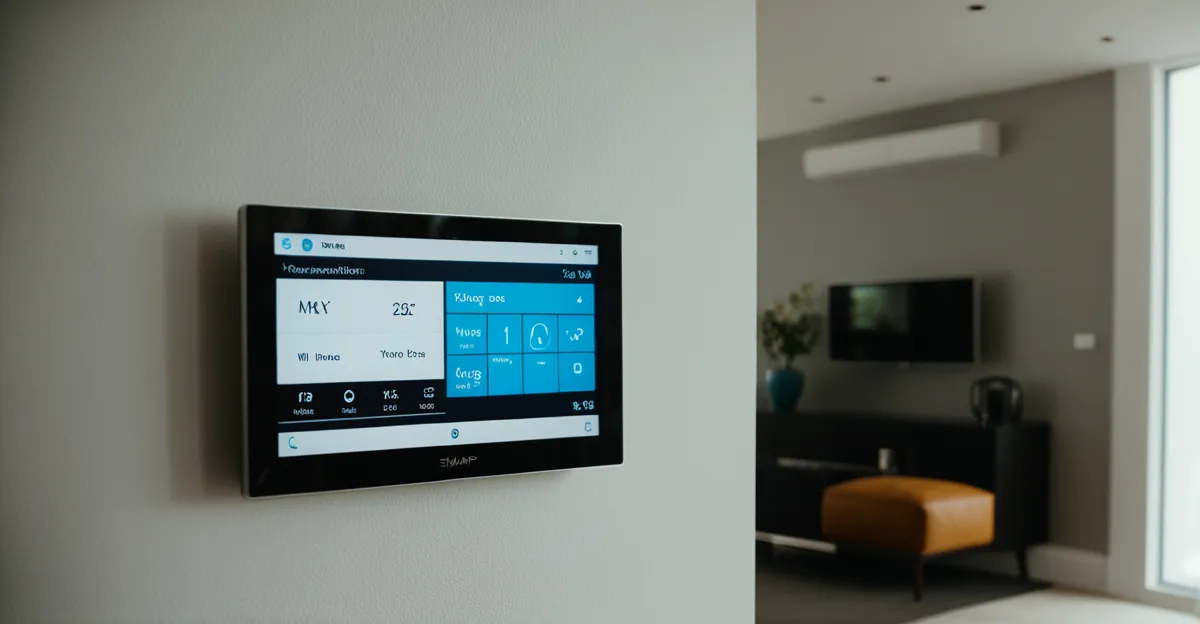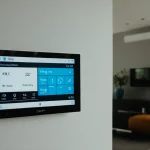How Home Automation Is Shaping Daily Life in the UK
Home automation is increasingly woven into the daily routine of UK households, transforming how people interact with their living spaces. At its core, home automation relies on interconnected devices controlled through centralized systems, enabling convenience, efficiency, and enhanced comfort. Key components include smart thermostats, lighting controls, voice assistants, and security devices, all integrated via Wi-Fi or dedicated smart home hubs.
In the UK, the adoption of smart home technology has accelerated, driven by rising consumer awareness and the desire to manage energy consumption amid fluctuating utility costs. Popular trends include the use of programmable heating systems, automated lighting schedules, and security monitoring accessible remotely through mobile devices. These advances align closely with the UK’s focus on energy-saving measures and personalized living environments.
Also to discover : How Can Home Design Transform Your Daily Life in the UK?
The influence of home automation on daily life is profound. For many UK households, routines evolve as simple tasks become automated: heating adjusts to occupancy patterns, lights turn on or off without manual intervention, and security systems alert users in real time. This reshaping of habits not only adds convenience but fosters energy efficiency and improved home safety, signaling an ongoing transformation in how everyday living is experienced throughout the country.
Everyday Applications of Home Automation
Experience the convenience and efficiency of smart home technology in action
Topic to read : What Innovative Home Styles Are Trending in the UK?
In UK households, smart lighting and automated heating are among the most popular applications of home automation. Smart lighting systems adjust brightness and color based on time of day or occupancy, reducing energy waste and enhancing ambience effortlessly. Automated heating uses programmable thermostats and sensors to tailor warmth to daily routines, lowering utility bills without sacrificing comfort.
Home security is another key area transformed by automation. Connected alarm systems, motion detectors, and smart locks offer real-time alerts and remote control via mobile devices. This integration heightens home safety, allowing users to monitor their residences regardless of location.
Connected appliances also play a growing role in automating daily tasks. From smart ovens preheated en route home to refrigerators that track groceries, these devices streamline routines and reduce manual effort. This connectivity enhances both efficiency and user experience within the UK’s modern homes.
Together, these technologies demonstrate how home automation seamlessly integrates into various aspects of everyday life, promoting convenience, energy savings, and security tailored to UK lifestyles.
UK-Specific Benefits of Home Automation
Home automation offers significant benefits for UK homes, particularly in enhancing energy efficiency and accessibility adapted to the unique UK climate and lifestyle. By integrating smart devices that optimise energy use—such as programmable heating and smart lighting—households consistently reduce their utility bills while maintaining comfort. This targeted approach not only aligns with fluctuating UK energy costs but also supports national goals to lower carbon footprints.
Accessibility improvements are another important benefit. Home automation systems can provide customised assistance for elderly or disabled residents, making everyday tasks simpler and promoting independence. For example, voice-activated controls and automated doors help overcome mobility challenges, improving quality of life without relying heavily on assistance.
Furthermore, the integration of renewable energy solutions with home automation in the UK is growing. Smart solar panels and battery storage systems communicate with automated home devices to efficiently manage energy use based on supply and demand. This synergy fosters sustainability while ensuring consistent energy availability. Additionally, many UK home automation setups are designed to work seamlessly with local services to enhance convenience and support community energy initiatives.
Together, these benefits demonstrate how home automation in UK homes enhances daily life through energy savings, improved accessibility, and smart integration with sustainable technologies.
How Home Automation Is Shaping Daily Life in the UK
Home automation in the UK depends on several core components working together seamlessly. Central to this system are smart home technology devices such as voice assistants, smart thermostats, automated lighting, and security sensors. These components communicate through Wi-Fi or dedicated hubs, creating an interconnected network that UK households can control remotely. This integration allows for synchronized management of multiple devices, making everyday tasks smoother and more intuitive.
Major trends in British smart home adoption include a strong focus on energy management and security. Given the UK’s often variable climate and increasing energy costs, programmable heating and smart lighting have become widely favoured. These technologies adjust settings automatically based on occupancy and time of day, demonstrating how home automation fits naturally into the UK’s lifestyle priorities. Another notable trend is the growing acceptance of voice-controlled assistants, which enhance accessibility and convenience for diverse age groups.
The initial impact of home automation on daily routine is significant. Many users report changes such as heating turning on before they arrive home or lights activating as they enter rooms, reducing manual adjustments. Security alerts sent to smartphones offer peace of mind, while automation frees individuals from repetitive tasks, allowing more focus on other activities. This early transformation sets the stage for deeper integration of technology into the everyday lives of UK residents, reshaping how homes respond to user habits and preferences.
How Home Automation Is Shaping Daily Life in the UK
Home automation in the UK centers on a core set of interconnected devices, including voice assistants, smart thermostats, automated lighting, and security sensors. These components communicate through Wi-Fi or dedicated hubs, enabling users to control multiple functions remotely and synchronously. This seamless integration forms the backbone of daily routines, allowing UK households to optimize comfort and efficiency with minimal manual intervention.
Major trends driving smart home technology adoption in the UK focus heavily on energy management and security. Given the country’s often unpredictable weather and rising utility costs, programmable heating and smart lighting systems adjust automatically based on occupancy and the time of day. This automation supports energy conservation while matching UK residents’ lifestyle needs. Additionally, voice control has gained prominence, offering enhanced accessibility and user convenience across all age groups.
The initial impact of smart home technology on daily routine is already noticeable. UK users frequently report heating starting before they arrive home or lights turning on upon entering a room, reducing the need for manual adjustments. Real-time security alerts delivered to smartphones provide peace of mind, and automated scheduling eases the management of repetitive tasks. Together, these changes illustrate how home automation steadily reshapes daily life by adapting proactively to user habits and preferences.
How Home Automation Is Shaping Daily Life in the UK
Home automation in the UK is built upon key components such as smart thermostats, voice-controlled assistants, automated lighting, and security devices. These elements integrate seamlessly through Wi-Fi or dedicated hubs, creating interconnected systems that allow users to manage multiple functions from smartphones or other interfaces. This connectivity not only simplifies control but also enhances responsiveness to daily habits.
Major trends permeating UK households focus on energy efficiency and security. With fluctuating energy prices and an emphasis on sustainability, programmable heating and smart home technology that adapts to occupancy and time of day have become widespread. This automation reduces manual intervention, optimising energy consumption without compromising comfort. Security features, including real-time alerts and automation of locks and cameras, offer reassurance and elevate home safety standards.
The impact on daily routine is tangible. Many UK residents note that heating begins adjusting before they arrive home, and lights activate automatically upon room entry—actions that eliminate repetitive tasks and enhance convenience. These developments illustrate how home automation is progressively embedded into everyday life, shaping habits and improving how households function across the country.
How Home Automation Is Shaping Daily Life in the UK
Home automation in the UK revolves around a core set of interconnected devices that work together to enhance everyday living. These smart home technology components typically include voice-controlled assistants, smart thermostats, automated lighting systems, and security sensors. Integration occurs through Wi-Fi or dedicated hubs, enabling seamless communication and centralized control via smartphones or other interfaces. This connectivity transforms how British households manage their environments, making adjustments more intuitive and responsive to individual needs.
Current trends in the UK highlight a strong focus on energy management and home security. Rising utility costs and environmental concerns have increased demand for home automation features that optimize energy use, such as programmable heating that adapts to occupancy and time of day, significantly influencing users’ daily routine. Additionally, smart lighting systems that automatically adjust brightness contribute to energy savings while enhancing atmosphere. Security remains a priority as well, with real-time alerts from smart locks, alarms, and sensors integrated into daily life for added peace of mind.
The impact on daily habits is immediate and noticeable. Many users report that automated functions simplify routine actions—heating activates before arrival, lights respond to room occupancy, and security notifications arrive promptly on mobile devices. This level of automation reduces manual tasks and allows individuals to focus more on their priorities, signaling a meaningful shift in how UK households experience convenience, comfort, and safety through technology.



